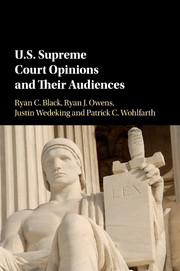Book contents
- Frontmatter
- Dedication
- Contents
- Acknowledgement
- 1 Introduction
- 2 A theory: using opinion clarity to enhance compliance and manage public support
- 3 Estimating the clarity of Supreme Court opinions
- 4 Supreme Court opinions and federal circuit courts
- 5 Supreme Court opinions and federal agency implementors
- 6 Supreme Court opinions and the states
- 7 Supreme Court opinions and the secondary population
- 8 Establishing compliance as a function of clarity
- 9 Conclusion
- References
- Index
2 - A theory: using opinion clarity to enhance compliance and manage public support
Published online by Cambridge University Press: 05 February 2016
- Frontmatter
- Dedication
- Contents
- Acknowledgement
- 1 Introduction
- 2 A theory: using opinion clarity to enhance compliance and manage public support
- 3 Estimating the clarity of Supreme Court opinions
- 4 Supreme Court opinions and federal circuit courts
- 5 Supreme Court opinions and federal agency implementors
- 6 Supreme Court opinions and the states
- 7 Supreme Court opinions and the secondary population
- 8 Establishing compliance as a function of clarity
- 9 Conclusion
- References
- Index
Summary
In Cervantes v. Guerra (1981), the Fifth Circuit Court of Appeals examined whether a government-funded, nonprofit organization constitutionally could prohibit foreigners from serving on the organization's board. The Hildago County Community Action Agency received federal money (pursuant to the Economic Opportunity Act of 1964) to provide services to the poor. Federal law stated one-third of its board of governors had to be “chosen in accordance with democratic selection procedures adequate to assure that they are representative of the poor in the area served.” After the Agency adopted a bylaw declaring non-citizens could neither serve on the board nor vote to select its members, two non-citizens challenged it. They claimed the bylaw violated the Equal Protection Clause of the Constitution.
The judges on the Fifth Circuit panel that heard the case most certainly opposed the bylaw personally. Judge John Minor Wisdom, a moderate Eisenhower appointee, had been instrumental in pushing racial desegregation in the South (Bass 1981; Friedman 2009). John Robert Brown, another moderate Eisenhower appointee, also made his mark on desegregation, earning a spot (along with Wisdom) in the so-called Fifth Circuit Four – a group of judges who pushed for racial integration (Bell 1982). Rounding out the three-judge panel was Carol Dineen King, a Jimmy Carter appointee. Each of these judges’ policy preferences seemed to oppose the bylaw. None seemed to have an interest in upholding it. Yet they did uphold it. As the panel put it: “when the Supreme Court speaks clearly, we are bound to obey.”
In contrast, the Fourth Circuit Court of Appeals disobeyed the Supreme Court in Davis v. Davis (1981). At issue was whether a forty-year prison sentence for the possession of nine ounces of marijuana violated the Eighth Amendment (i.e., the cruel and unusual punishment provision). The Fourth Circuit, in an en banc ruling, held it did. On review, the Supreme Court vacated that decision and sent the case back to the Circuit for reconsideration. The Circuit quickly reaffirmed its previous decision in a ruling many believe amounted to the liberal judges’ repudiation of the increasingly conservative Supreme Court. And by “many,” we include the Supreme Court. The High Court was not pleased. It reviewed the case a second time – and the justices showcased their displeasure with the Fourth Circuit's intransigence.
- Type
- Chapter
- Information
- US Supreme Court Opinions and their Audiences , pp. 17 - 39Publisher: Cambridge University PressPrint publication year: 2016

